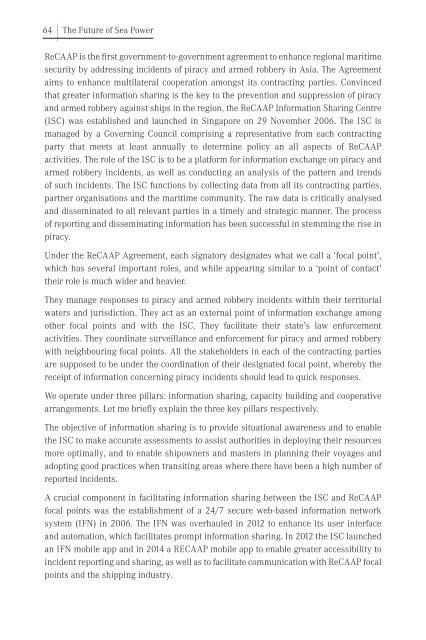THE FUTURE OF SEA POWER
SPC2015_Proceedings
SPC2015_Proceedings
Create successful ePaper yourself
Turn your PDF publications into a flip-book with our unique Google optimized e-Paper software.
64 |<br />
The Future of Sea Power<br />
ReCAAP is the first government-to-government agreement to enhance regional maritime<br />
security by addressing incidents of piracy and armed robbery in Asia. The Agreement<br />
aims to enhance multilateral cooperation amongst its contracting parties. Convinced<br />
that greater information sharing is the key to the prevention and suppression of piracy<br />
and armed robbery against ships in the region, the ReCAAP Information Sharing Centre<br />
(ISC) was established and launched in Singapore on 29 November 2006. The ISC is<br />
managed by a Governing Council comprising a representative from each contracting<br />
party that meets at least annually to determine policy an all aspects of ReCAAP<br />
activities. The role of the ISC is to be a platform for information exchange on piracy and<br />
armed robbery incidents, as well as conducting an analysis of the pattern and trends<br />
of such incidents. The ISC functions by collecting data from all its contracting parties,<br />
partner organisations and the maritime community. The raw data is critically analysed<br />
and disseminated to all relevant parties in a timely and strategic manner. The process<br />
of reporting and disseminating information has been successful in stemming the rise in<br />
piracy.<br />
Under the ReCAAP Agreement, each signatory designates what we call a ‘focal point’,<br />
which has several important roles, and while appearing similar to a ‘point of contact’<br />
their role is much wider and heavier.<br />
They manage responses to piracy and armed robbery incidents within their territorial<br />
waters and jurisdiction. They act as an external point of information exchange among<br />
other focal points and with the ISC. They facilitate their state’s law enforcement<br />
activities. They coordinate surveillance and enforcement for piracy and armed robbery<br />
with neighbouring focal points. All the stakeholders in each of the contracting parties<br />
are supposed to be under the coordination of their designated focal point, whereby the<br />
receipt of information concerning piracy incidents should lead to quick responses.<br />
We operate under three pillars: information sharing, capacity building and cooperative<br />
arrangements. Let me briefly explain the three key pillars respectively.<br />
The objective of information sharing is to provide situational awareness and to enable<br />
the ISC to make accurate assessments to assist authorities in deploying their resources<br />
more optimally, and to enable shipowners and masters in planning their voyages and<br />
adopting good practices when transiting areas where there have been a high number of<br />
reported incidents.<br />
A crucial component in facilitating information sharing between the ISC and ReCAAP<br />
focal points was the establishment of a 24/7 secure web-based information network<br />
system (IFN) in 2006. The IFN was overhauled in 2012 to enhance its user interface<br />
and automation, which facilitates prompt information sharing. In 2012 the ISC launched<br />
an IFN mobile app and in 2014 a RECAAP mobile app to enable greater accessibility to<br />
incident reporting and sharing, as well as to facilitate communication with ReCAAP focal<br />
points and the shipping industry.


